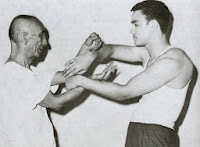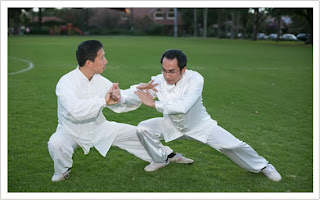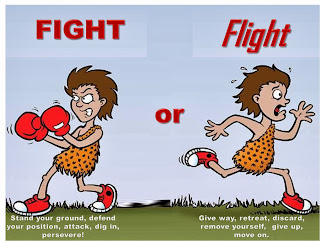Pretend that, while walking on an icy road, you slip. What is your reaction, your response? Mostly, we are so caught by surprise that we become stiff. That is followed by a fall. Frequently we land on our hands and, if we are lucky, only hurt ourselves and not broke wrists. If we had a knowledge how to “properly” fall, we would have “let go” and yield ourselves to a fall. Most likely, no harm to our body would be done, we would only get wet. Which we get anyway.
“The grasses abate in the direction the wind blows.” says a Chinese proverb.
Responsiveness is a reply to the adjustment to changes of events in nature so the same way we should respond in our everyday life. When a person is challenged, he can in fact ‘allow to be surprised’ or indeed ‘be surprised’. And responsiveness is definitely the key ingredient in all martial arts. In Wing Chun special techniques are used to master a more sophisticated form of reflex, a sensitized reflex, better known as responsiveness. But, for this to master, one has to see many details before. Details of how one stands, where the center of gravity is, what the body’s position is, where the central line is aiming, how someone breathes in and exhales, where the gaze is directed to, where the energy flows, where is the looseness and where the tension, as well as the directions of the opponent’s force or energy.
 Therefore, winning in martial arts is more or less all about responsiveness. It requires the correct responses to different situations. If you are too late, you lose. “Being late” here refers to a time span when you are surprised and, although able and in good physical condition, you do not know what to do or how to react. We should be all aware that a martial artist who is not able to instantly (instinctively) reacts to an attack, has simply not studied the art well, but learned the movements without a context. Or, worse, has just memorized the exact movements as a reply to an exact situation. And this is too slow and less or not efficient. Relaxation and repetitions are the key to responsive reflexes. If muscles are tense, the response time is slower. Listen to your body as your body always knows the correct reply. When you train for years and repeat the movements thousands of times, the response is in your body. Also Bruce Lee knew it, and he was right about it when in one of his movies he said ‘Shifu, I did not hit him; it was my body that did it.’
Therefore, winning in martial arts is more or less all about responsiveness. It requires the correct responses to different situations. If you are too late, you lose. “Being late” here refers to a time span when you are surprised and, although able and in good physical condition, you do not know what to do or how to react. We should be all aware that a martial artist who is not able to instantly (instinctively) reacts to an attack, has simply not studied the art well, but learned the movements without a context. Or, worse, has just memorized the exact movements as a reply to an exact situation. And this is too slow and less or not efficient. Relaxation and repetitions are the key to responsive reflexes. If muscles are tense, the response time is slower. Listen to your body as your body always knows the correct reply. When you train for years and repeat the movements thousands of times, the response is in your body. Also Bruce Lee knew it, and he was right about it when in one of his movies he said ‘Shifu, I did not hit him; it was my body that did it.’ In leadership it is the same. Some leaders encompass a need to be liked, others fear of response. Leaders that fear failure are most often indecisive, defensive, and aversive to risk taking. They could be also aggressive. When a leader is too aggressive, the members ‘subside like the grass.’ If a leader is too soft, he is not taken seriously. Self-confident leaders are good listeners, patient, they endure in times of important decisions; but when they speak, they speak with confidence, and when they work, they don’t use or abuse power. So, an exceptional leader is aware that too much interference hinders the work process of a team. Such a leader is calm and collected.
In leadership it is the same. Some leaders encompass a need to be liked, others fear of response. Leaders that fear failure are most often indecisive, defensive, and aversive to risk taking. They could be also aggressive. When a leader is too aggressive, the members ‘subside like the grass.’ If a leader is too soft, he is not taken seriously. Self-confident leaders are good listeners, patient, they endure in times of important decisions; but when they speak, they speak with confidence, and when they work, they don’t use or abuse power. So, an exceptional leader is aware that too much interference hinders the work process of a team. Such a leader is calm and collected.

No comments:
Post a Comment
Note: Only a member of this blog may post a comment.